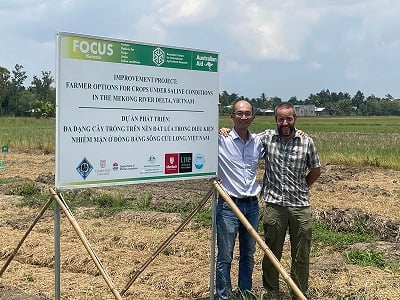 |
Jason CondonScientist - Charles Sturt University
“I’m forever grateful – I’m a better researcher for it, I’m a better project leader, I’m a better support for the staff.”
|
Soil science researcher, Jason Condon, was so struck by Vietnam when on holiday here in 2000, that in 2006, when offered the chance for a 6-month sabbatical overseas, Vietnam was his top choice.
His first thought was to approach the Vietnamese author of a scientific paper that was on a similar topic to his PhD. The author was based at Can Tho University (CTU) in the Mekong Delta and welcomed the idea, offering accommodation at the university and opportunities for Jason’s wife – a GIS spatial analyst – to work at the university while in country. He continues to work with the same people at CTU to this day, describing the “great friendships” they have formed.
Jason grew up on a farm in Australia and lectures at Charles Sturt University – a regional university – so he appreciates and has an interest in the needs of farmers, who, he says, face similar issues in Australia and Vietnam. “Our work has to have an impact,” he says, “it’s not about science for science sake. It’s something you can tell a farmer about and they are interested because they see the relevance of it.”
His work with ACIAR has further developed his understanding of research for development, and he’s been thrilled to be working on ACIAR-funded projects in the Mekong Delta since 2010 – also with CTU - starting with a rice shrimp project.
Jason enthuses about the huge impact the collaboration between Charles Sturt University, ACIAR and Can Tho University has, not only on farmers but on the broader team.
Talking of the team, he explains how, after the sabbatical, he would bring groups of 20 university students over from CSU for agricultural study tours in the Delta. Some of these students wanted more experience in Vietnam so he started a program skilling up honours students in Australia and sending them to Can Tho for fieldwork.
Researchers also travel from CTU to CSU, for example through the Crawford Fund https://www.crawfordfund.org/ (also supported by ACIAR).
“All the people, the students we’ve brought over and the Vietnamese that have come to CSU…I don’t even know how you quantify that kind of impact,” he continues. “You can do it on numbers of people but each line item is a person – and this work is an experience and an enrichment of their life. That’s massive and super rewarding to be involved in. To be able to operate in a space where you can give other people opportunities.”
Success is also thanks to the great partner he has here in Vietnam – he’s known Dr Khoi, the in country project lead, since 2006. “I don’t have to work hard to push an agenda because we have the same priorities. It’s a nice relationship – we’re in it for the same reasons. And because he’s like that, the team is unified and everyone understands what we are about.”
He is equally positive about the impact on farmers, not just financially but in the impact it has on their lives and their families. His current project with ACIAR is the FOCUS project (Farmer Options for Crops Under Saline conditions), which is a project looking at the problems created by climate change. “You’re dealing with farmers who have crop failure, where 10 years ago they didn’t and so there’s a whole lot of upskilling needed to help them identify the problem and deal with it and create other options so they can have profitable crops and avoid the salinity and avoid the drought conditions. One farmer has taken our suggestions and now has profitable crops and he is so happy because that means he doesn’t have to leave the farm to go and get work so he can stay on farm and look after his grandkids. And that is why you do it – right there.”
Talking further about the importance of their work here, Jason says, “If we weren’t here, the farmers would come up with something that worked, but we’re doing the science behind it, so if it works, we understand why it works and if you understand how it works and what the risks are, you can start to future proof it for sustainable results. Research is hard… but the easy options don’t give you the rewards.”
Looking forward, Jason hopes the relationships will continue to develop and sees great opportunities for scientists who have worked in the Mekong Delta to take their expertise elsewhere. “People need researchers who can handle the problems of the future,” he says.
In conclusion, Jason makes a personal point: “I am a better research and project leader thanks to my experiences here. I feel very privileged.”
